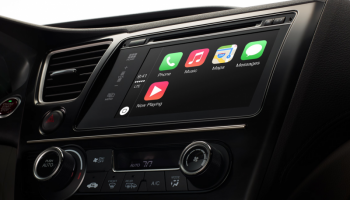 With the launch of Apple's new CarPlay last week at the automobile trade show in Geneva, many were left wondering if you had to buy a new Ferrari or Mercedes or Volvo in order to get it. Apparently, the answer is no. 9To5Mac has reported that at least some automakers will be offering aftermarket CarPlay installation for older models. They've confirmed that Mercedes will be doing this, and expect others to do so as well. This is good news, and it will be really interesting to see how it develops. Apple has made a fortune giving us better interfaces for our technology: first personal computers, then MP3 players, then smartphones, then tablets—and now the automobile.
With the launch of Apple's new CarPlay last week at the automobile trade show in Geneva, many were left wondering if you had to buy a new Ferrari or Mercedes or Volvo in order to get it. Apparently, the answer is no. 9To5Mac has reported that at least some automakers will be offering aftermarket CarPlay installation for older models. They've confirmed that Mercedes will be doing this, and expect others to do so as well. This is good news, and it will be really interesting to see how it develops. Apple has made a fortune giving us better interfaces for our technology: first personal computers, then MP3 players, then smartphones, then tablets—and now the automobile.
CarPlay lets you listen to music, access maps, get driving directions, make and receive calls, listen to and send text messages, listen to podcasts, and more. You can take advantage of features of your iPhone without taking your eyes off the road or your hands off your steering wheel. A dedicated button on the steering wheel invokes Siri, which is the main way you control CarPlay. If your car has a touch-panel display, you can also interact with CarPlay using that. In addition, you can use the knobs and buttons on your car, such as the volume control, to control CarPlay.
One thing about CarPlay is quite odd, though: its implementation differs from automaker to automaker. For example, some vehicles will have a touch panel control, others won't. In the past Apple has always exerted tight control over the user experience, and didn't allow for this sort of variation. They make the hardware, they make the software, and they want to give you the best experience possible. Which is one reason they approve every single iOS app. In fact, when Steve Jobs returned to Apple back in 1997, one of the first things he did was discontinue licensing the Apple OS to other hardware manufacturers—a practice that was begun in his absence in an attempt to emulate the success of Microsoft's licensing of Windows. Jobs wanted none of that. He wanted control. Yet here's Apple offering CarPlay and giving up control over aspects of the user experience.
Some are also wondering about the safety of CarPlay. CNNMoney reported last week that the National Safety Council has expressed concern about it. Apparently, research suggests that focusing on other tasks while driving, even eyes-free, can adversely affect safety. One might think that it's safer than manually texting or making calls while driving. But according to the CNNMoney article, "[S]ome evidence suggests that talking in hands-free mode while driving is just as unsafe as driving while holding a phone. The problem is so-called 'cognitive distraction,' which occurs when drivers have their eyes on the road but their minds focused elsewhere."